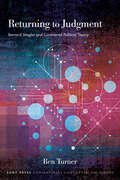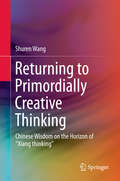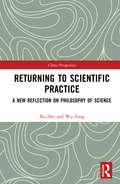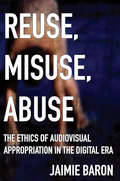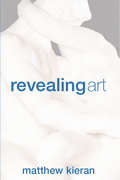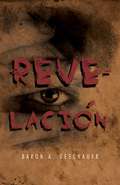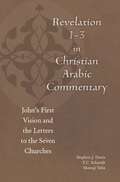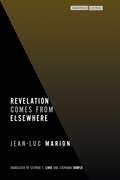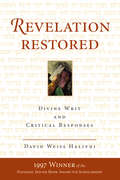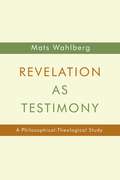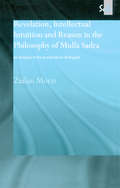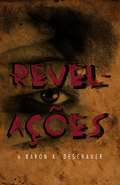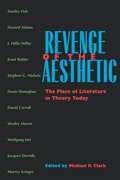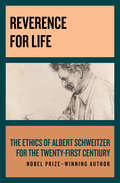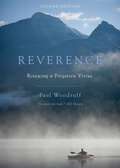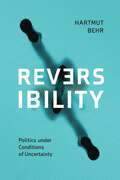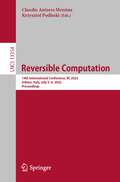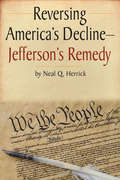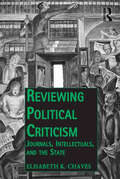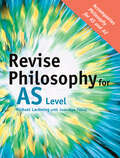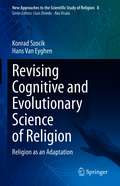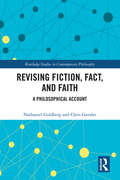- Table View
- List View
Returning to Judgment: Bernard Stiegler and Continental Political Theory (SUNY series in Contemporary Continental Philosophy)
by Ben TurnerReturning to Judgment provides the first extensive treatment of political judgment in the work of Bernard Stiegler and the first account of his significance for contemporary continental political thought. Ben Turner argues that Stiegler breaks with his predecessors in continental philosophy by advocating for, rather than retreating from, the task of proposing totalizing judgments on political problems that extend beyond the local and the particular. He shows that the reconciliation of judgment with continental political thought's commitment to anti-totalization structures the entirety of Stiegler's philosophy and demonstrates that this theory of the political decision highlights the difficulties that contemporary political ontology faces when addressing global and large-scale political problems. The book provides an overview of Stiegler's philosophy useful for those unfamiliar with his thought, shows how he draws on key influences including Deleuze, Derrida, Freud, and Simondon to develop his conception of judgment, and considers the challenges and consequences of his embrace of totalizing political decisions.
Returning to Primordially Creative Thinking: Chinese Wisdom On The Horizon Of Xiang Thinking
by Lin Zhang Shuren WangThis book identifies that “Xiang thinking” is the eidetic connotation and a fundamental trait of traditional Chinese thinking, offering insights of considerable methodological significance. "Xiang thinking" is a mode of thinking different from conceptual thinking or idealized rational thinking and, in a certain sense, it is more primal. In the past century, particularly since 1949, the primary works on Chinese philosophical history have, as a rule, addressed the ancient Chinese tradition of philosophical ideas by virtue of the philosophies of Plato, Descartes and Hegel: methods that inherently challenge Chinese philosophical insights. This has naturally led to the fact that the insights as such remained obscured. This book starts to reverse this trend, intending to help Chinese people understand and appraise themselves in a more down-to-earth fashion. In addition, it is particularly helpful to people of other cultures if they want to understand ancient Chinese philosophy and culture in a context of fresh and inspiring philosophical ideas. (By Zhang Xianglong)
Returning to Scientific Practice: A New Reflection on Philosophy of Science (China Perspectives)
by Xu Zhu Wu TongThis book is a result from a collective study on philosophy of scientific practice (PSP), which began around 2002 and still ongoing. There is an apparently increasing interest in scientific practice, influenced by the historicistic philosophy of science and the sociology of scientific knowledge (SSK). Prof. WU Tong and his research group believe that it is necessary for PSP to turn from the theory-dominant position to the practice dominance. PSP has also put forward the possibility of reinterpreting the epistemic status of local knowledge in Chinese tradition, which provides the most significant motivation to participate this study. In this book, we have selected three main cases – namely, Chinese medicine, Fengshui, and Ethnobotany – to examine the effect of PSP. The aim of our collective study is not merely on theoretical construction of PSP, but also to consider the various applications of PSP, especially for re-interpreting and demonstrating the variety of local knowledge from traditional China, which seems to be a genuine contribution to the international enterprise of philosophy of science, particularly made by Chinese scholars.
Reuse, Misuse, Abuse: The Ethics of Audiovisual Appropriation in the Digital Era
by Jaimie BaronIn contemporary culture, existing audiovisual recordings are constantly reused and repurposed for various ends, raising questions regarding the ethics of such appropriations, particularly when the recording depicts actual people and events. Every reuse of a preexisting recording is, on some level, a misuse in that it was not intended or at least anticipated by the original maker, but not all misuses are necessarily unethical. In fact, there are many instances of productive misuse that seem justified. At the same time, there are other instances in which the misuse shades into abuse. Documentary scholars have long engaged with the question of the ethical responsibility of documentary makers in relation to their subjects. But what happens when this responsibility is set at a remove, when the recording already exists for the taking and repurposing? Reuse, Misuse and Abuse surveys a range of contemporary films and videos that appropriate preexisting footage and attempts to theorize their ethical implications.
Revealing Art
by Matthew KieranWhy does art matter to us, and what makes it good? Why is the role of imagination so important in art? Illustrated with carefully chosen colour and black-and-white plates of examples from Michaelangelo to Matisse and Poussin to Pollock, Revealing Art takes us on a compelling and provocative journey.Kieran explores some of the most important questions we can ask ourselves about art: how can art inspire us or disgust us? Is artistic judgement simply a matter of taste? Can art be immoral or obscene, and should it be censored? He brings such abstract issues to life with fascinating discussions of individual paintings, photographs and sculptures, such as Michelangelo's Pieta, Andres Serrano's Piss Christ and Francis Bacon's powerful paintings of the Pope.He also suggests some answers to problems that any one in an art gallery or museum is likely to ask themselves: what is a beautiful work of art? and can art really reveal something true about our own nature?Revealing Art is ideal for anyone interested in debates about art today, or who has simply stood in front of a painting and felt baffled.
Revelación a Baron A. Deschauer
by Baron Alexander DeschauerDESCRIPCIÓN DEL LIBRO Este libro establece el secreto de estar contento y feliz. Establece el significado de la vida. Establece las infinitas posibilidades disponibles para todos nosotros. Este libro está escrito de una manera que todos puedan entender sin referencia a personas vivas o muertas ni que requieren años de estudio filosófico o teológico. Presenta ideas que trascienden barreras sociales, económicas y académicas. Como un espejo refleja la imagen del espectador, este libro reflejará los pensamientos y experiencias del lector. El objetivo de este libro es tener una mayor comprensión por parte del lector de sí misma y su conexión absoluta con todos los seres vivos. Para tener un mayor efecto, se recomienda leer los capítulos en voz alta.
Revelation 1-3 in Christian Arabic Commentary: John's First Vision and the Letters to the Seven Churches (Christian Arabic Texts in Translation)
by Ibn Kātib Qayṣar Būlus al-BūshīThe first publication in a new series—Christian Arabic Texts in Translation, edited by Stephen Davis—this book presents English-language excerpts from thirteenth-century commentaries on the Apocalypse of John by two Egyptian authors, Būlus al-Būshī and Ibn Kātib Qas.ar. Accompanied by scholarly introductions and critical annotations, this edition will provide a valuable entry-point to important but understudied theological work taking place at the at the meeting-points of the medieval Christian and Muslim worlds.
Revelation Comes from Elsewhere (Cultural Memory in the Present)
by Jean-Luc MarionJean-Luc Marion has long endeavored to broaden our view of truth. In this illuminating new book—his deepest engagement with theology to date—Marion proposes a rigorous new understanding of human and divine revelation in a deeply phenomenological key. Although today considered the central theme of theology, the concept of Revelation was almost entirely unknown to the first millennium of Christian thought. In a penetrating historical deconstruction, Marion traces the development of this term to the rise of metaphysics from Aquinas through Suárez, Descartes, and Kant; formalized into an epistemological framework, this understanding of Revelation has restricted philosophical and theological thinking ever since. To break free from these limits, Marion takes hints from theologians including Barth and Balthasar while mobilizing the phenomenology of givenness to provide a rigorous new understanding of revelation as a mode of uncovering. His extensive study of the Jewish and Christian Scriptures unfolds a logic of Trinitarian phenomenality, worked out in conversation with Basil, Augustine, Hegel, Schelling, and others, that ultimately transforms our very notions of being and time. The result is precisely what we have come to expect from this acclaimed philosopher: masterful historical scholarship working in tandem with daring originality.
Revelation Restored: Divine Writ And Critical Responses (Radical Traditions Ser.)
by David W HalivniIn this thought-provoking book, David Weiss Halivni asserts that the act of acknowledging and accounting for inconsistencies in the Pentateuchal text is not alien to the Biblical or Rabbinic tradition and need not belie the tradition of revelation. Moreover, the author argues that through recognizing textual problems in the scriptures, as well as e
Revelation as Testimony: A Philosophical-Theological Study
by Mats WahlbergAccording to the pre-modern Christian tradition, knowledge of God is mainly testimonial: we know certain important truths about God and divine things because God himself has told them to us. In academic theology of late this view is often summarily dismissed. But to do so is a mistake, claims Mats Wahlberg, who argues that the testimonial understanding of revelation is indispensable to Christian theology.Criticizing the currently common idea that revelation should be construed exclusively in terms of God’s self manifestation in history or through inner experience, Wahlberg discusses the concept of divine testimony in the context of the debate about how any knowledge of God is possible. He draws on resources from contemporary analytic philosophy -- especially John McDowell and Nicholas Wolterstorff -- to argue for the intellectual viability of revelation as divine testimony.
Revelation, Intellectual Intuition and Reason in the Philosophy of Mulla Sadra: An Analysis of the al-hikmah al-'arshiyyah (Routledge Sufi Series)
by Zailan MorisThis book examines and analyses the legitimacy of the widely held claim that Mulla Sadra's philosophy (al-hikmah al-muta'aliyyah) is a synthesis of principles and doctrines drawn from revelation (wahy), gnosis ('irfan/ma'rifah) and discursive philosophy (al-hikmah al-bahthiyyah). In Mulla Sadra's view, these three major sources of knowledge can be brought together without contradiction and accorded their respective roles in the human quest for true and certain knowledge. This book discusses and demonstrates how Mulla Sadra achieves this synthesis as contained in and exemplified by his text, al-Hikmah al-'arshiyyah or Wisdom from the Divine Throne. An evaluation on whether or not Mulla Sadra's synthesis is successful is also undertaken. The criteria used for the evaluation are the internal coherence of his ideas, their conformity to Islamic teachings and impact on Islamic thinkers after him.
Revelações a Baron A. Deschauer
by Baron Alexander DeschauerEste livro define o segredo de ser feliz e contente. Ele define o significado da vida. Ele define as infinitas possibilidades que estão disponíveis para todos nós. Este livro é escrito de uma maneira que todos possam entender, sem referência a pessoas vivas ou mortas, nem exigindo anos de estudo filosófico ou teológico. Apresenta idéias que transcendem as barreiras sociais, econômicas e acadêmicas. Como um espelho reflete a imagem do espectador, este livro refletirá os pensamentos e experiências do leitor. O objetivo deste livro é oferecer ao leitor uma maior compreensão sobre si mesmo e de sua conexão absoluta com todas as coisas vivas
Revenge and Social Conflict
by Christensen Kit R.Revenge has been a subject of concern in most intellectual traditions throughout history, and even when social norms regard it as permissible or even obligatory, it is commonly recognised as being more counterproductive than beneficial. In this book, Kit Christensen explores this provocative issue, offering an in-depth account of both the nature of revenge and the causes and consequences of the desire for this kind of retaliatory violence. He then develops a version of eudaimonistic consequentialism to argue that vengeance is never morally justified, and applies this to cases of intergroup violence where the lust for revenge against a vilified 'Them' is easily incited and often exploited. His study will interest a wide range of readers in moral philosophy as well as social philosophers, legal theorists, and social/behavioural scientists.
Revenge of the Aesthetic: The Place of Literature in Theory Today
by Michael P. ClarkThis cutting-edge collection of essays showcases the work of some of the most influential theorists of the past thirty years as they grapple with the question of how literature should be treated in contemporary theory. The contributors challenge trends that have recently dominated the field--especially those that emphasize social and political issues over close reading and other analytic methods traditionally associated with literary criticism. Written especially for this collection, these essays argue for the importance of aesthetics, poetics, and aesthetic theory as they present new and stimulating perspectives on the directions which theory and criticism will take in the future. In addition to providing a selection of distinguished critics writing at their best, this collection is valuable because it represents a variety of fields and perspectives that are not usually found together in the same volume. Michael Clark's introduction provides a concise, cogent history of major developments and trends in literary theory from World War II to the present, making the entire volume essential reading for students and scholars of literature, literary theory, and philosophy.
Reverence for Life: The Ethics of Albert Schweitzer for the Twenty-First Century
by Albert SchweitzerThis &“little gem of a book&” shares the Nobel laureate&’s profound insights on ethics, ecology, human rights, and more (Jane Goodall). The theologian and humanitarian Albert Schweitzer dedicated his life to the betterment of mankind. In 1952, he was awarded the Nobel Prize for his philosophy of Reverence for Life—and for the many ways he put that philosophy into action. This volume gathers together his thoughts on this profound and deeply influential concept. Based on a fundamental respect and compassion for all living things, Schweitzer&’s philosophy sought to reconcile the conflicting drives of egoism and altruism. He applied this ethical perspective to a host of topics, from war and peace to arts, animal rights, and forming a global community. Reverence for Life draws on Schweitzer&’s diverse writings across decades, including excerpts from previously unpublished letters to John F. Kennedy, Norman Cousins, Bertrand Russell, and others. A foreword by former US Ambassador, Roger Gamble, an introduction by the editor, Harold E. Robles, and a brief biographical sketch of Schweitzer&’s life round out this essential volume.
Reverence for Life: The Ethics of Albert Schweitzer for the Twenty-First Century
by Albert SchweitzerThis &“little gem of a book&” shares the Nobel laureate&’s profound insights on ethics, ecology, human rights, and more (Jane Goodall). The theologian and humanitarian Albert Schweitzer dedicated his life to the betterment of mankind. In 1952, he was awarded the Nobel Prize for his philosophy of Reverence for Life—and for the many ways he put that philosophy into action. This volume gathers together his thoughts on this profound and deeply influential concept. Based on a fundamental respect and compassion for all living things, Schweitzer&’s philosophy sought to reconcile the conflicting drives of egoism and altruism. He applied this ethical perspective to a host of topics, from war and peace to arts, animal rights, and forming a global community. Reverence for Life draws on Schweitzer&’s diverse writings across decades, including excerpts from previously unpublished letters to John F. Kennedy, Norman Cousins, Bertrand Russell, and others. A foreword by former US Ambassador, Roger Gamble, an introduction by the editor, Harold E. Robles, and a brief biographical sketch of Schweitzer&’s life round out this essential volume.
Reverence: Renewing A Forgotten Virtue
by Paul WoodruffReverence is an ancient virtue that survives among us in half-forgotten patterns of civility and moments of inarticulate awe. Reverence gives meaning to much that we do, yet the word has almost passed out of our vocabulary. <p><p> Reverence, says philosopher and classicist Paul Woodruff, begins in an understanding of human limitations. From this grows the capacity to be in awe of whatever we believe lies outside our control -- God, truth, justice, nature, even death. It is a quality of character that is especially important in leadership and in teaching, although it figures in virtually every human relationship. It transcends religious boundaries and can be found outside religion altogether. <p><p> Woodruff draws on thinking about this lost virtue in ancient Greek and Chinese traditions and applies lessons from these highly reverent cultures to today's world. The book covers reverence in a variety of contexts -- the arts, leadership, teaching, warfare, and the home -- and shows how essential a quality it is to a well-functioning society. <p><p> First published by Oxford University Press in 2001, this new edition of Reverence is revised and expanded. It contains a foreword by Betty Sue Flowers, Distinguished Teaching Professor Emeritus at the University of Texas at Austin, a new preface, two new chapters -- one on the sacred and one on compassion -- and an epilogue focused on renewing reverence in our own lives.
Reversibility in Dynamics and Group Theory
by Anthony G. O'Farrell Ian ShortReversibility is a thread woven through many branches of mathematics. It arises in dynamics, in systems that admit a time-reversal symmetry, and in group theory where the reversible group elements are those that are conjugate to their inverses. However, the lack of a lingua franca for discussing reversibility means that researchers who encounter the concept may be unaware of related work in other fields. This text is the first to make reversibility the focus of attention. The authors fix standard notation and terminology, establish the basic common principles, and illustrate the impact of reversibility in such diverse areas as group theory, differential and analytic geometry, number theory, complex analysis and approximation theory. As well as showing connections between different fields, the authors' viewpoint reveals many open questions, making this book ideal for graduate students and researchers. The exposition is accessible to readers at the advanced undergraduate level and above.
Reversibility – Politics under Conditions of Uncertainty
by Harmut BehrWestern modernity is characterized by instrumental relations between humans and nature, as well as between humans themselves, that have caused irreversible environmental and social exploitation and degradation. Many policy documents, such as those by the United Nations Environment Programme, warn of the uncertainty and unpredictability of our precarious conditions due to our social and ecological interrelations and interdependencies.Accepting that our position in the world does not allow us secure knowledge of the consequences of politics, Reversibility – Politics under Conditions of Uncertainty asks how we can act politically in a responsible way when we cannot predict the outcomes of our decisions. Hartmut Behr diagnoses Western modernity and its manifold crises as dominated by the view that fellow humans and natural environments are merely means to our individual ends. Behr introduces a novel ethics of self-restraint and the principle of reversibility – a commitment to political actions whose effects shall not be indefinite or immutable – to build a policy framework that demands both ethical and practical reflection on the conditions of action and that accounts for the limitations under which we act and live.Identifying an urgent need for re-thinking political progress and for policy reform, Reversibility – Politics under Conditions of Uncertainty presents a new understanding of the self and of political responsibility centred in a genuine acknowledgment of the human condition.
Reversible Computation: 14th International Conference, RC 2022, Urbino, Italy, July 5–6, 2022, Proceedings (Lecture Notes in Computer Science #13354)
by Krzysztof Podlaski Claudio Antares MezzinaThis book constitutes the refereed proceedings of the 14th International Conference on Reversible Computation, RC 2022, which was held in Urbino, Italy, during July 5-6, 2021. The 10 full papers and 6 short papers included in this book were carefully reviewed and selected from 20 submissions. They were organized in topical sections named: Reversible and Quantum Circuits; Applications of quantum Computing; Foundations and Applications.
Reversing America's Decline: Jefferson’s Remedy
by Neal Q. HerrickThe Declaration of Independence, Constitution, and Federalist Papers are the driving forces of American government. Thomas Jefferson held that the Federalist Papers contain the "genuine meaning" of the Constitution. Author Neal Herrick focuses on the "manifest tenor," the general principles, structural principles and operational principles as they are stated and implied in the Declaration and shows how Jefferson's interpretation could be applied to today's government to reverse national decline. Midwest Book Review: Neal Herrick's new book, Reversing America's Decline, celebrates our Constitution and reminds us that our founding fathers handed it down as a 'work-in-progress' -- for us to alter in times of crisis. The crux of Herrick's book is that it is 'love's labor lost' to fight a lot of separate battles in a money-controlled government. Instead, he suggests putting our energy into reforming government so that it responds to people rather than to money. In a lucid analysis, he shows the limitations of capitalism, detailing how corporations build out of self-interest and maximize profits taking as few precautions as lax government standards will allow. Herrick calls for a more realistic approach than expecting corporations to erode their profits by doing more for society. He considers landmark cases that facilitated, for example, the transfer of money from the corporate world to Congress, and argues that it is time to revise the Constitution of the United States with a 2nd constitutional convention and a bi-partisan strategy. At the very moment when constitutional amendments are under heavy fire, Herrick's book is more than timely: it's portentous. This is a 'must-read' for patriotic Americans of either political party.
Reviewing Political Criticism: Journals, Intellectuals, and the State (Public Intellectuals and the Sociology of Knowledge)
by Elisabeth K. ChavesReviewing Political Criticism examines the rise of the ’review’ form of journal publication, from the early eighteenth to the early twenty-first centuries. The review belongs to a long tradition of written political criticism that first advised, then revised, and with the increased confidence afforded to civil society by the rise of market capitalism, subsequently challenged and even transformed the state’s view on what and how it governed. Chaves investigates the crucial nexus of intellectual debate with political judgment over this time, and highlights the review’s central role in upholding this connection. Focusing upon critical moments that required the exercise of political judgment, the book explains this journal form as a means of political practice, one that essentially ’re-views’ the state’s view of how society should be ordered. To understand critical activity, one must reflect on where this activity takes place-on the institutions of criticism that sustain it. Referred to by some as the ’natural habitat’ of intellectuals, journals, as the institutionalized sites of theoretical discourse, are often overlooked. This groundbreaking book offers a concentrated critique of the review form of journal publication as a medium for political thought and action, as a decisive site for political judgment by the state’s conservers and critics.
Revise Philosophy for AS Level
by Michael LacewingRevise Philosophy for AS Level is the definitive revision guide for students of the Advanced Subsidiary level syllabus. Following the AQA syllabus, it helps students revise using past exam questions, examiner's reports, and tips on revision for the examination. Also included are a helpful glossary and annotated further reading. It covers all three units of the AS Level syllabus: Unit 1: Theory of Knowledge Unit 2: Moral Philosophy and Philosophy of Religion Unit 3: Texts. The four set texts are discussed: Plato's The Republic, Descartes' Meditations, Marx and Engels’ The German Ideology and Sartre’s Existentialism and Humanism. Essential reading for all students of AS Level Philosophy, it is an ideal companion to the textbook Philosophy for AS and A2, also published by Routledge.
Revising Cognitive and Evolutionary Science of Religion: Religion as an Adaptation (New Approaches to the Scientific Study of Religion #8)
by Konrad Szocik Hans Van EyghenThis unique and pioneering book critically appraises current work from both the cognitive science of religion and the evolutionary study of religion. It addresses the question: Why does the believer possess supernatural or religious beliefs in the combined context of his cognitive biases, their adaptive usefulness measured in terms of survival and reproduction, and the impact of social learning and cultural traits? The authors outlines a pluralistic approach to the study of religion that does not treat religion as an accidental by-product but an adaptation selected by natural selection. Chapters discuss the role of religious components for the evolution of cooperation and altruism, and explore the development of atheism and secular ideas, in cognitive and evolutionary terms. Topics such as the usefulness of religion, the transmission of religious beliefs, and a Darwinian approach to religion are among those addressed. Contrary to standard views, religious biases are regarded as shaped by cultural influences and not merely by natural dispositions. This monograph will particularly appeal to researchers who are looking for a scientific explanation of religion and religious beliefs but who do not stop at the level of narrow cognitive and evolutionary accounts. The work will also be of interest to students of philosophy, sociology, religious studies, theology, or anthropology who seek to explain such fascinating, complex, and unequivocal phenomena as religion and religious components.
Revising Fiction, Fact, and Faith: A Philosophical Account (Routledge Studies in Contemporary Philosophy)
by Chris Gavaler Nathaniel GoldbergThis book addresses how our revisionary practices account for relations between texts and how they are read. It offers an overarching philosophy of revision concerning works of fiction, fact, and faith, revealing unexpected insights about the philosophy of language, the metaphysics of fact and fiction, and the history and philosophy of science and religion. Using the novels of J.R.R. Tolkien as exemplars, the authors introduce a fundamental distinction between the purely physical and the linguistic aspects of texts. They then demonstrate how two competing theories of reference—descriptivism and referentialism—are instead constitutive of a single semantic account needed to explain all kinds of revision. The authors also propose their own metaphysical foundations of fiction and fact. The next part of the book brings the authors’ philosophy of revision into dialogue with Thomas Kuhn’s famous analysis of factual, and specifically scientific, change. It also discusses a complex episode in the history of paleontology, demonstrating how scientific and popular texts can diverge over time. Finally, the authors expand their philosophy of revision to religious texts, arguing that, rather than being distinct, such texts are always read as other kinds, that faith tends to be more important as evidence for religious texts than for others, and that the latter explains why religious communities tend to have remarkable historical longevity. Revising Fiction, Fact, and Faith offers a unique and comprehensive account of the philosophy of revision. It will be of interest to a wide range of scholars and advanced students working in philosophy of language, metaphysics, philosophy of literature, literary theory and criticism, and history and philosophy of science and religion.
